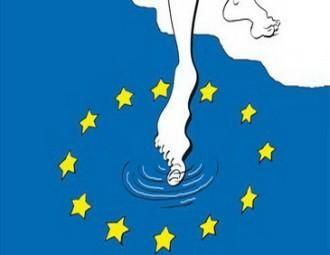Andrei Yahorau: We should force the authorities to reverse their policy towards Europe

Eastern Partnership Summit in Vilnius cannot unfreeze Belarus-Europe relations per se.
Last week Road Map Monitoring on the reform process in EaP countries was presented in Brussels. Belarusian part of the monitoring was performed and presented by Andrei Yahorau, the head of the Center for European Transformation, who has informed EuroBelarus Information Service about the results of his work:
- After the Eastern Partnership Summit in Warsaw Eastern Partnership Road Map was adopted. This Road Map defined the tasks and goals of cooperation between all countries-members of this program – including both bi- and multilateral cooperation.
Here we are talking about the agreements that should have been signed, about the projects to be realized and about the scheduled events.
The Road Map itself is a perfunctory document; usually formal changes or changes within the national legislation were considered. Of course, this factor constrained the Road Map itself. However, it also defined common coverage of the EaP.
It is an open secret that Belarus’ contribution within the EaP is reduced to technical cooperation and diplomatic negotiations. The projects which are being implemented generally apply to integrative boundary control, customs cooperation, cooperation in the scope of energetics, ecology. The cooperation is developing in the spheres where Belarusan state can either be given a huge infrastructural project or it pursues pecuniary interests. In case the EU also demonstrates interest, these projects are implemented.
However, Belarus is not very willing to cooperate in the spheres where reforms are required, and it completely ignores the spheres where civil society is present.
Belarus is very active in the spheres with formal participation; administrative reformation and anti-corrupt occurrences are at stake. The problem with ombudsman hasn’t improved a bit; so is the reformation of the election legislation, justice, administrative reform.
- Will the EaP Summit in Vilnius be conductive to the actual activation of bilateral cooperation?
- The Summit in Vilnius itself cannot further activation of Belarus-Europe relations. Neither can it promote the renovation of full-fledged dialog between the two sides. The problem consists in the actions of the Belarusan authorities.
The only barrier to activation of bilateral relations are political prisoners. As soon as this obstacle disappears, the dialog on the satisfactory level would be quite easy to renovate.
- How can the authorities be forced to release political prisoners then?
- Unfortunately, EU doesn’t have any leverage to put pressure on Belarusan authorities and make them release the political prisoners. It is rather an internal affair of the Belarusans themselves, of the whole nation, who might want to move towards Europe. People should force the authorities to reverse the state policy towards Europe.
Otherwise the authorities will continue their repressive politics, releasing some political prisoners and taking hostage the others. It is the common task for the civil society, opposition, the whole nation to make the authorities change their politics towards European.
-
03.01
-
07.10
-
22.09
-
17.08
-
12.08
-
30.09








































